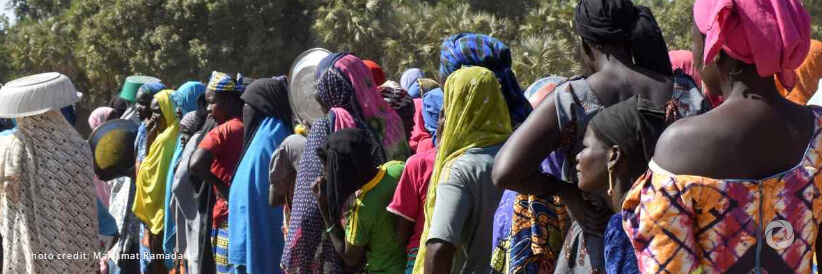A decade of violence in the Lake Chad basin has resulted in half a million displaced people living in the Far North region of Cameroon. The large scale of this displacement, combined with the effects of climate change, has created a crisis of access to land in the region, which is particularly acute for women.
The Norwegian Refugee Council (NRC) is deeply concerned about the increasing vulnerability of displaced people who are unable to exercise their right to access land, both during their displacement and after their return.
“Displaced populations have no choice other than to farm on marginal, poor quality land, without legal security or protection against forced evictions. Women in particular are stripped of their property and land by members of their own family, a common practice that must be tackled to ensure inclusive and equal opportunities for all. Access to land is essential to ensure people can produce food for themselves and support their families. Alarmingly these rights are very often not respected, leaving people struggling. Both local and national authorities must act to protect the land rights of internally displaced persons and refugees, particularly women, and to ensure equitable land management,” said Elena Vicario, NRC’s Country Director in Cameroon.
Housing, land, and property rights are drawn from international law and the right to adequate housing and are what makes it possible for people to live on their land and use their property. A new assessment conducted by NRC in Cameroon’s Far North region found more than 50 per cent of people surveyed did not own or have access to housing, land, and property.
In the region, discriminatory customary laws give men more rights than women on housing, land, and property issues. As a result, many women are forced to live in precarious settlements, such as with host families, temporary shelters for displaced people, lodgings donated by traditional leaders, or temporary camps.
“If we had land, we could farm and be able to take care of our children. We wouldn’t have to live on camp distributions. But without the land, you can’t do all that,” said Rifkatou, a female refugee living in the Minawao refugee camp with her four children.
In addition to this, displaced communities face a wide range of issues: limited access to arable land, destruction of crops, discrimination in rental prices, forced evictions, secondary occupation, allocation of land without ownership documents, and poorly managed agro-pastoral conflicts that often leave them worse off. The lack of basic infrastructure, such as schools, health centers, and water points further exacerbates the precarious situation of displaced communities, who are struggling to resettle.
“NRC calls for immediate action by the local authorities to find lasting solutions to this land crisis, by creating a better protection framework related to rental arrangements. This will support the resolution of housing, land, and property disputes and improve women’s ability to enjoy their right to access land. It is crucial that the rights of displaced people are protected, and that concerted efforts are made to enable them to access arable land, rebuild their lives, and regain dignity. International donors too must step up to support housing, land, and property programs. They should ensure such work is integrated into the humanitarian response, including through shelter, food security,,y and livelihoods programs, to prevent the risk of eviction and exploitation, and to strengthen the safety and resilience of those affected by the crisis,” added Vicario.

